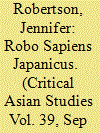| Srl | Item |
| 1 |
ID:
079844


|
|
|
|
|
| Publication |
2007.
|
| Summary/Abstract |
Japan accounts for nearly 52 percent of the world's share of operational robots and leads the postindustrial world in the development of humanoid robots designed and marketed specifically to enhance and augment human society. Innovation 25, Prime Minister Abe's visionary blueprint for remaking Japanese society by 2025, with the aim of reversing the declining birthrate and accommodating the rapidly aging population, emphasizes the central role that household robots will play in stabilizing core institutions, like the family. In addition to exploring the cultural logic behind the development of autonomous, intelligent, evolutionary humanoid robots, I argue that new bio-and robot technologies are being deployed to reify old or "traditional" values, such as the patriarchal extended family and sociopolitical conservatism.
|
|
|
|
|
|
|
|
|
|
|
|
|
|
|
|
| 2 |
ID:
079845


|
|
|
|
|
| Publication |
2007.
|
| Summary/Abstract |
Adivasis(aboriginal peoples) in southeastern Gujarat, India, have been subjected to an accelerated process of accumulation by dispossession through the construction of large dams, as well as through the privatization of common property resources. Neo-Gandhian social movements, such as the Narmada Bachao Andolan (NBA), have used transnational activism to gain exposure for these issues but in the process have lost local support in the state, particularly after a negative court judgment in 2000. This article identifies three major reasons for the declining support for NBA in Gujarat. The first arises from the repressive nature of agrarian relations that have emerged through the capitalization of agriculture in the state. The second is the NBA's failure to link their opposition to displacement by large dams with similar examples of accumulation by dispossession in other regions of rural Gujarat, hence precluding any unity between poor peasants and adivasis elsewhere in the state. Finally, neo-Gandhianism represented adivasis through a discourse of ecological romanticism that did not reflect existing realities and tended to privilege urban, middle-class perspectives. Pushed from above and below, the NBA movement lost the support even of the adivasis it claimed to represent.
|
|
|
|
|
|
|
|
|
|
|
|
|
|
|
|